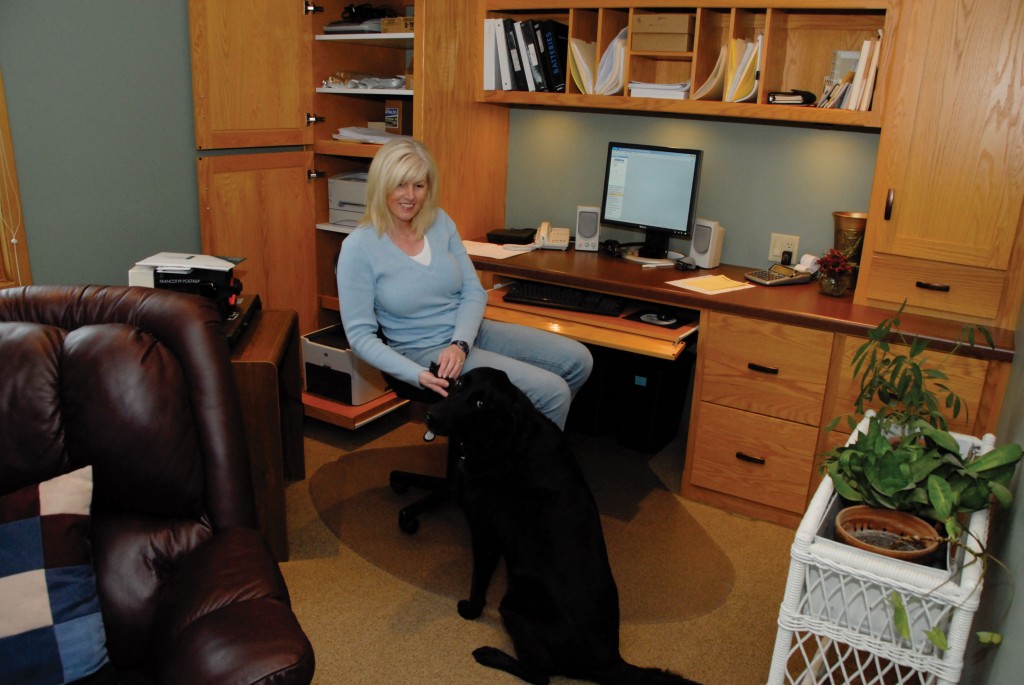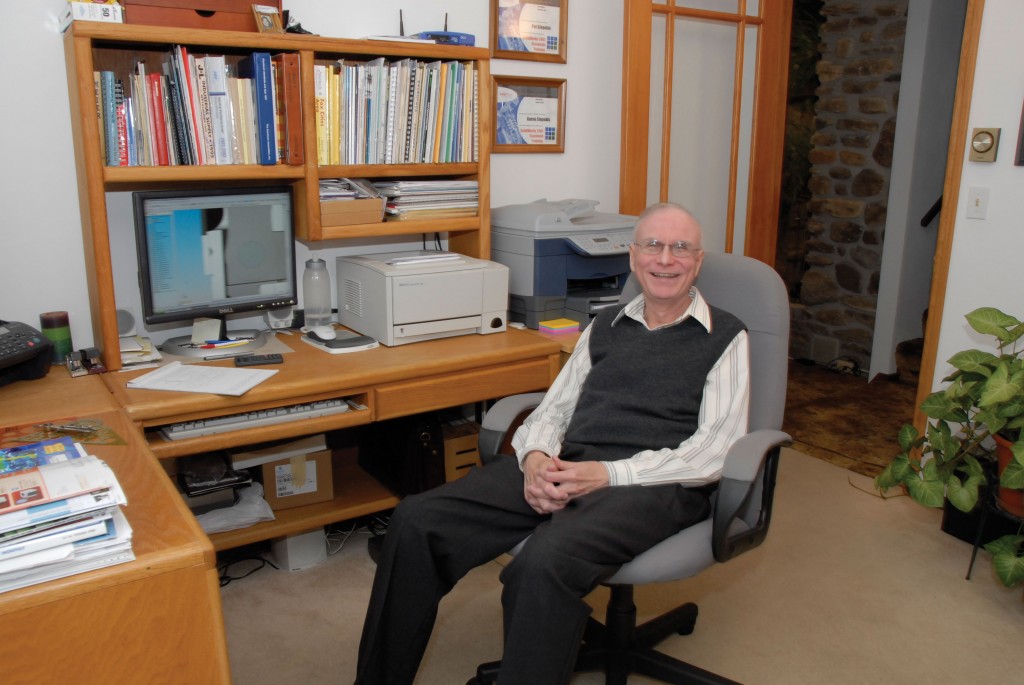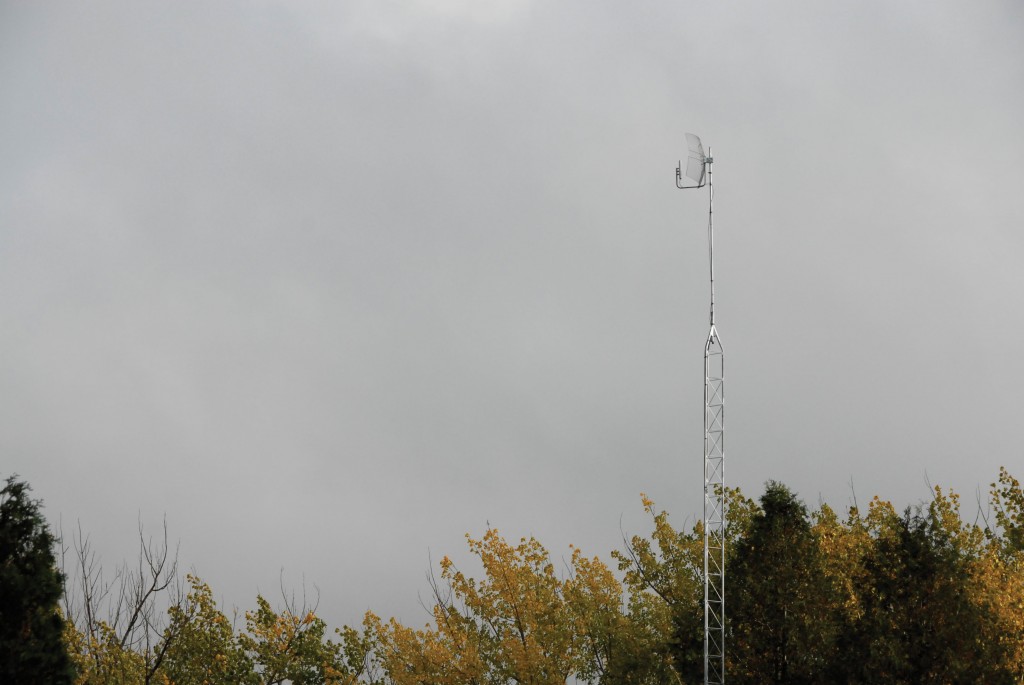Speeding Off to “Virtual Work” on the Information Highway
- Share
- Tweet
- Pin
- Share

Every morning Jana Raines of Baileys Harbor finishes her morning coffee and a chat with her husband and leaves for work – in Somerset, New Jersey, 1,047 miles away. It takes only seconds as she sits at her desk, just off the living room, turns on her computer and logs onto the company’s website with its new state-of-the-art software.
“Once I log on it’s like I’m sitting at a desk out there in New Jersey; it’s pretty slick, fully integrated,” said Jana. As one of a growing number of telecommuters in Door County, Jana is a trendsetter, but that is a surprise to her. “To me, it’s just work!” she declared.
Telecommuting, increasing on the Door Peninsula, as elsewhere, is defined at Dictionary.com as “working at home and communicating with your fellow workers through the phone, typically with a computer and modem.”
Even though telecommuting, also known as “working virtually,” has the potential to change the way we all live and work, many of us remain unaware of it. Call it an invisible force since you can’t actually see it, but virtual workers can be found in most every geographic location and demographic slice of the county.
Telecommuting is being done in condos and cottages, second homes and permanent residences – and by residents of villages, second home communities like Horseshoe Bay, and in locations as far removed from population centers as Washington Island. There are even some telecommuters out in the bay on Chambers Island.
Some are “on vacation” and able to stay away for longer and longer periods from the daily grind back in Milwaukee, St. Paul, or Chicago because they can still get enough of their work done through their computer to justify their absence at the office. Some are “locals” pursuing full-time careers from their year-round homes.

Though they may form a workforce that is invisible to most of us, the technology community is well aware of their increasing numbers, and the potential which virtual work represents. At Online Door County, for example, Nate Bell has had a ringside seat from which to observe it.
Nate started his work as a network administrator in 2001, and it has been Nate’s specific job – his mission, really – to design and set up a network that offers high-speed internet via a fixed wireless system. Existing towers around the county and across the waters of Green Bay are used to mount transmitters which send a signal to small radio receivers installed on the property of each of his customers. Online Door County, and a similar outfit, Door Peninsula Internet, are aiming especially for the customer base that remains unserved by cable lines.
Two years ago Nate could claim 100 customers. Today he has nearly 500. Not all are using their high-speed connection to telecommute – some are businesses, while others are homeowners who just want internet access. But over time Nate has learned that many of his customers depend on the network he has designed for the work they do everyday.
At the Door County Economic Development Corporation in Sturgeon Bay, Sam Perlman is also keeping an eye on growing technology requirements as one part of his job assisting developing businesses.
Sam said companies and individuals have faced challenges in getting high-speed internet connections in Door County. Because of its remote location and the low population density here, “the incumbent telecommunication providers – Verizon and AT&T — have been slow to update their facilities. That being said, there have certainly been improvements over the past two or three years,” said Sam. There are options now, he noted, at least in the city of Sturgeon Bay and some of the villages where, in addition to fixed wireless, a cable connection is available through Charter Communications and there is also some DSL (digital subscriber line) service.

“Telecommuting is something that we see as having great potential for Door County,” he added. “We get calls on a regular basis from people who want to spend more time here and want information about how to make it work.”
While some search for ways to balance job requirements and a Door County lifestyle, others are already doing it – some of them, for quite a while.
Patrick Slepekis, for example, a designer of hydraulic-powered rescue systems for a Chicago-based firm, moved to Door County 19 years ago. Patrick, a native of Sheboygan, and his wife, from Illinois, were living in the Chicago area when they visited the peninsula for the first time in September 1986. Delighted with the natural beauty and the slower pace, they felt their cares ease as they visited shops and enjoyed the vistas and fall colors. A second trip a year later confirmed for the couple that this was a place they wanted to move to and raise their young son and daughter. “It was an easy decision to want to come here, but how to come and make a living…that was a big problem,” Patrick recalled.
When his boss was looking for a new location to open a second plant for the expanding company, Patrick took the initiative to suggest that he might consider Sturgeon Bay, but was told that proximity to O’Hare airport was essential. “So I took a step back in my strategy and said ‘how about moving just the engineering department (I was the only one, the only engineer, at that time) to Sturgeon Bay?’” he related. “My boss looked at me, and said ‘I see you are serious about this. What do you have in mind?’”

Thus began a telecommuting relationship — one that relied on the phone, the fax machine, and periodic visits to Chicago in the early years — that has persevered for two decades. This boss, said Patrick, was always an innovator and willing to take a chance on an off-site engineer if it kept a valued employee happy and producing good work. The risk he took paid off. Over the years Patrick, the products he designs, and the company, Amkus Rescue Systems, have all prospered.
Another couple that elected to say goodbye to city life is Quinn and Suzanne Brennan who, after 15 years in Philadelphia, made the decision to live year round in their Sister Bay home on the water. From there they have been managing their global recruiting business, Translink.net. They also travel both for business and pleasure, and they are raising their two young sons in what they feel is an idyllic environment.
“It’s paradise,” said Quinn, his enthusiasm for Door County and their life here impossible to miss. “We loved the big city, but always wanted to raise our boys in a small town on the water so we could pursue our love of the outdoors, boating and sailing. It’s working out very well for us,” he added. “We like the environment and are not looking back.”
Owning waterfront Door County property had once been only a dream for the Brennans. And it was a dream that came as something of a surprise to Quinn. He had grown up in Green Bay, worked in Door County restaurants as a teenager, and knew about all things “Midwestern.” There was a time when he finished college that he couldn’t wait to leave the area behind and seek his fortune on the East Coast. He found what he wanted in the restaurant business, managing dining establishments first in Boston, then in Philadelphia where he met and married Suzanne.

Somewhere on the East Coast Quinn began to reflect on the positive influence of his Midwestern upbringing and all the beauty that was so easily accessible back in Door County. Quinn’s energy is contagious as he relives this memory. In 1991, the Brennans started their own management consultant business taking the first steps toward the virtual office in their future. Today Translink.net is a leading staffing and recruiting firm, searching, Quinn explained, “for highly specialized consultants to meet requests from large enterprise companies.” The company boasts a network of 8,300 potential contacts to meet such requests. On the homepage of the company’s website, reference to the Sister Bay office is displayed prominently next to contact information for its headquarters in Gwynedd Valley, Pennsylvania.
Translink.net is not the only East Coast company displaying a Door County presence on its website. If you log on to BatteryZone.com, you will find a way to contact that New Jersey company here in Baileys Harbor. This will lead you to Jana Raines.
Reflecting on her New Jersey-based job, Jana said, “People are always asking me how I found this job, and it’s a bit of a long story. It kind of found me and has evolved over the years.” Jana is one of the Accounts Payable clerks – the only one not in New Jersey – for Battery Zone, an online and mail order supplier of batteries.
Jana began working for her current employer while a college student at Rutgers University. After graduating in 1987, Jana moved to rural Pennsylvania and endured a 70-mile commute each way to the job. Four years later, when she decided to return to her native Door County, Jana didn’t try to bring the New Jersey job back to Wisconsin, but it followed her anyway. Home again, she was involved in setting up a new mail order business in Baileys Harbor which was eventually purchased by her former employer. And so Jana became Battery Zone’s first telecommuter.

Friendly and down-to-earth, she is happy to share the details of the clerical, administrative, and customer service tasks she does all day online and happy to tell you, too, “I think most people would feel my job is somewhat mundane, but I love my job and the flexibility it brings. It suits me.” She calls it “a plug and chug” job which means, she explained, “I have these set tasks. I upload, download or post and just keep working along through the day.”
Others, meanwhile, take advantage of the improved technology to bounce between their primary cities and the county. When Jim Hickstein, for example, made the decision to move back to the upper Midwest after 20 years in the high-octane computer-fueled industry of Silicon Valley, a cottage in Door County was part of the lure. Jim settled in St. Paul in 2003 and “even made sure my home would be on the east side of the Twin Cities to make the trip to Door County as easy as I possibly could,” he said.
Jim remains an employee of a California company. He is a consultant for setting up and using the information security software programs of the Tablus Company. He travels considerably to install these products, and when not on the road he is telecommuting full time either from his home in the Twin Cities or from the cottage near Sawyer Harbor.
“My grandfather bought the property – it was a fishing shack – in 1966,” said Jim, who values his memories of time spent there nearly every summer of his life. “All the time that I lived in California, the most time I could arrange to come was two weeks every summer,” he said; not enough, he added.

Jim is determined to keep the cottage in his family and to work from there whenever possible. When he had only a dial-up connection, Jim could not work from the cottage more than a few hours at a time. “I could never spend an entire week doing it,” he said. He now gets fixed wireless from an Online Door County tower in Peshtigo. “That’s 15 nautical miles across the water,” he explained, “and before I could get that I was preparing to build my own 90-foot tower so that I could reach a signal from their tower north of Sturgeon Bay.”
Since the routine of daily life in Door County often involves multiple trips between villages, telecommutes can prove as useful for those who live and work within the county as those whose work is based across the country or around the globe.
It is 41 miles from Gills Rock to the Government Center in Sturgeon Bay – an 82-mile, 2-hour round trip – “so there is a significant cost in time and money,” said Charlie Most, the Chairman of the Door County Board, who resides on the tip of the peninsula. Saving that trip for “meetings, office hours, and when my signature is needed on a document,” he now routinely accesses such things as emails, meeting minutes, agendas, and tax collection reports via his internet connection at home.
Greg Swain, too, has an office in Sturgeon Bay but spends about 50 percent of his time working out of an office at home in Fish Creek. Greg develops software for the tourism industry and his company, Bay Lakes Information Systems LLC, has two products in use by sites throughout Wisconsin and also in Niagara Falls. The company was located entirely in Greg’s home from 1984 until 1995 when he found it necessary to expand and create the Sturgeon Bay office. Still, he finds much of his work in his home office more productive and the arrangement more compatible with family life.
When you look for them, tele- commuters – virtual workers and their virtual offices – become visible all over the peninsula, wherever a high-speed internet connection can be provided. For what this might mean in the future, Sam Perlman (Door County Economic Development Corporation) makes a prediction: “Data transfer, email and the internet are the things driving business today. The content that we are sending and receiving over the internet is becoming more and more robust, requiring greater and greater bandwidth,” he said. And the demand for such access, he believes, will continue exponentially.
How to Access the Information Highway
If you are going to travel the information highway as a telecommuting virtual worker, clearly, the one essential you will need is a high-speed connection to the internet.
All the telecommuters interviewed for this article expressed that sentiment in one way or another. All have had some personal experience pursuing their work through a dial-up connection, when that was all they could get. “Intolerable,” Jim Hickstein called the method. “Tedious and aggravating,” said Charlie Most. “Cumbersome,” Quinn Brennan said, putting it mildly.

Who will provide your high-speed connection in Door County depends heavily on where it is that you need the connection. Chances are you will find only one or two providers.
In Sturgeon Bay, though, there are several types of services, as well as providers. Charter Communications offers a connection through their cable network and AT&T offers a Digital Subscriber Line (DSL), as does Door Peninsula Internet.
A cable hook-up through Charter Communications may be available within the village limits of most villages in the county. To get information from the company you need to provide the zip code from the precise location where you want service. They then will tell you if they can service your location.
Fixed wireless is available from two companies: Door Peninsula Internet in the southern area, and Online Door County to the north. Either firm can offer you a connection if you are in the area where their service overlaps, between Egg Harbor, Jacksonport, and Sturgeon Bay.


